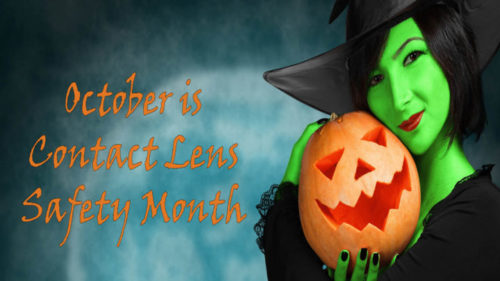Posted by: Eye Specialists of Mid Florida in Blog

By Dr. Thomas Hegland, O.D., Fall in Florida! The only change of colors you will see here are the colors of the license plates. Hopefully, there will be fewer high alerts for hurricanes as traffic is up, temps are down, and Homecomings and Halloween parties are flagged on families’ phones. It seems as though in recent years, that Halloween costumes are becoming much more elaborate now that adults are taking over the scene from the kiddies. Part of that ‘over the top’ trend are custom tinted or hand painted contact lenses used to achieve that Star Wars out of this world appearance.
While many millions of contact lenses are sold and worn worldwide without issues, these custom works of eye art can result in many unexpected complications. This is true especially with folks unfamiliar with the lenses’ usage and care. I was recently surprised on a stop at a local convenience store for gas to see tinted contacts for sale over the counter with no indication of age, composition, sterility or source of a product that was being sold next to incense and chewing tobacco. Contact lenses are a medical device that should be fit to the individual’s eye, whether a vision correction is required or not. While many modern lens designs and materials can be quite forgiving, a lens that is incorrectly fit or not disinfected properly can have sight-threatening implications. The most serious of these are corneal ulcers that can be caused by bacteria, viruses and even protozoans that can be sourced from contaminated lakes, rivers or wells. Certain bacterial ulcers can penetrate a cornea in 48 hours resulting in the loss of the eye. Even in less drastic cases, the clear cornea can be scarred resulting in permanently reduced vision unable to be corrected with spectacles or even leading to corneal transplants.
These pathologies can and do occur even to the most experienced and careful contact lens wearers, so the odds of them occurring to a novice are greatly enhanced. Veteran contact wearers have been known to get lenses stuck in their eyes from dryness or sleep and when the lenses are finally removed a very painful corneal abrasion can be the result. Allergic reactions to solutions and materials are also distinct possibilities. Listen to what your eyes are telling you when dealing with these little pieces of plastic or silicone. Only get lenses that are FDA approved and see your eye care practitioner for proper fit, handling, and care instruction. If you notice pain, foreign body sensations, blurry vision, redness or itching remove the lenses immediately. Do not decide to ‘power through’ because it’s ‘only one night for a few hours’. It may just cost you your ability to see those changing colors as they head north again.
